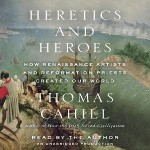DEC 2013
AUDIO BOOK REVIEWS
by Jonathan Lowe
 |
Thomas Cahill reads his book HERETICS
AND HEROES, an examination of the Renaissance
and Reformation in his Hinges of History series, with particular
emphasis on popes and kings, Thomas Moore, Martin Luther,
the Black Death, and how individuality's flowering put a damper
on the violent ignorance of the late Middle Ages. Parts of
the Middle East may still be living in those ages, but for
the most part religion in general and the Catholic Church
in particular has moved away from lopping the heads off (or
burning alive) those who disagree with it (although corruption
remains.) This is partly due to Da Vinci, Shakespeare, Galileo,
and others, but what is fascinating about this history is
how "all encompassing" religious oppression was
then, and how the poor citizen was powerless to resist being
jailed or murdered on a whim, (and without recourse to some
nonexistent law, since those who sold heaven and hell for
a fee owned both your body and soul.) In fact, one alternate
title for this book might be "Dictums and Victims."
Even Martin Luther, who resisted papal authority in favor
of reasoned interpretation of scriptures (free of selling
holy favors for gold), was not averse to having at least one
man burned alive for not believing in the Trinity. Why fire?
According to Cahill, because it prevented the heretic from
being resurrected. Cahill is not a fan of the Catholic church,
even into the modern age. Readers can only hope that reformation
and renaissance continues, and that we aren't pulled back
into historical darkness, ignorance, and violence once again. |
|
|
Why do wars happen, despite desires to live in peace? The question
is answered in THE
WAR THAT ENDED PEACE: The Road to 1914
by Margaret MacMillan, an award-winning historian,
PhD Fellow of the Royal Society, and professor of international
studies at Oxford. Read by Richard Burnip,
this 32 hour epic of audio non-fiction tells what led to WW1,
as crowned heads of Europe failed to support general expectations
for a prosperous future in the 20th Century, allowing events
to swing instead toward the hell of trench warfare and mustard
gas. MacMillan offers up a deep and compelling education on
the whys of war, which are many. Rampant expansionist Capitalism,
often cited by the liberal left as being a cause, did not play
a direct role in WW1. It was instead militarism and patriotism
that mostly did the deed, as the ethnic nationalism that Einstein
decried exploded like a firestorm, and sent young men in droves
to sign up and then die with their indoctrinations of fear and
hatred of outsiders. For years before the war there had been
(as there is today) a glorification of military virtues and
war heroes, especially from the conservative right. Then, as
now, says MacMillan, terrorists plagued societies with random
violence, while sports and the Olympics were espoused to prepare
young men to fight, to encourage nationalism, and for nation
states to perceive each other as rivals in a "survivor
takes all" game. This fomented ethnic racial tensions between
German and French peoples or between Celtic and Slavic peoples,
each side not only feeling superior, but also being told that
the other side needed to be "brought down." All that
it needed was one match to be dropped. And it was all supported
by Social Darwinism, a widespread belief that only the strong
deserved to survive, and that violent conflict was nature's
inevitable way to cull the inferior. Such beliefs next led to
the rise of Hitler, who glorified the idea of an ethnically
pure Super Race before whom the world must be forced to kneel.
This devastatingly prescient cautionary history is intricately
researched and relevant to politics as played today, the battle
lines drawn between any and all possible groups or cliques of
humans who don't see the fallacy of their jingoistic delusions
(of grandeur.)
|
|
|
Also new is
DAYS OF FIRE: Bush and Cheney in the
White House by Peter Baker, the definitive 29.5 hour
examination of their controversial presidential partnership
for those eight years that changed America forever, and plunged
us into off-the-charts deficit military spending at a time
when American banks were in orgiastic profit making mode.
Reader Mark Deakins narrates this chronological
moment by moment public and private account of how Bush ended
up with the lowest public confidence rating in history (worse
than Nixon at his end) due to "shock and awe" strategies:
shock due to sledge hammer tactics in the Middle East, and
awe that no one in the administration foresaw the financial
unraveling due to unregulated con artist banking CEOs. Bush
was even flummoxed by Alan Greenspan's signing off on bailouts
against his own six decade advice. Is politics a game, with
head butting concussions on both sides, rendering the players
addle brained? This is also obvious, which may explain why
McCain chose inexperienced airhead Sarah Palin as running
mate, and then called a big meeting during the financial crisis
only to mostly sit on his hands and effectively hand Obama
the presidency. Bizarre listening by the chief White House
correspondent for the NY Times, and author of The Breach and
Kremlin Rising.
|
|
 |
Donald Fagen of Steely Dan has a memoir
out titled EMINENT
HIPSTERS, which he reads
himself on audio, appropriately enough. Not being
an actor or stand up comic, he doesn't animate the text much,
and so mostly sounds like he's reading, the peek into his
personality coming from a cleaner, even tone. Not as dramatic
as Rita Moreno reading her memoir, (where you get to hear
her emotions in every sentence), or Steven Tyler's memoir,
(where you hear a massive ego expand into a weather balloon
destined for the stratosphere), Fagen is more about self deprecation
than ego, and has been a columnist with an acerbic wit for
many years. This might also explain why much of his work is
so original, satiric, and introspective. Who knew that he
was such a science fiction fan, and an analytical one to boot?
The first two of the four disks are interesting because Fagen
details his influences before and after attending Bard College,
with sideways glimpses of jazz luminaries (overrated or not,
like Henry Mancini) and others like Jean Shepherd---a magical
poet philosopher turned movie maker and video essayist (Jean
Shepherd's America), whom Fagen idolized until he saw him
on stage as a needy narcissist. The final two disks include
an extended diary of a more recent tour on the road as a "jazz
geezer."
|
|
|
Finally, Billy Collins is a former U.S.
Poet Laureate whose latest collection is AIMLESS LOVE,
wry and occasionally witty observations on various subjects
that are typically the realm of window sitters on trains or
in cars at parks. One of the short poems, (which could also
be described as verbal essays,) is titled "The Trouble
with Poetry,"and may explain why this is Collins first
compilation in twelve years.
It points to the dilemma of being a poet---of always seeking
to find a new poem everywhere, and to struggle to make the
new comparisons between things, which constitutes a poet's
reason for being. What happens after all comparisons have
been made, and you become unemployed? Of course it's not possible
to run out of observations until you're dead, but the point
is valid. What Collins tries to do in each poem is to state
the obvious, and then put a twist on it. The twist can be
subtle, or it can surprise. The best thing about his poems,
though, is that they know when to stop. He doesn't overwrite
them, like many poets I've heard reciting their work as is
they were reading the Ten Commandments or some other holy
text, trying to wow us with their importance. Which is more
important, anyway: the poet or the poem? |
|
| Jonathan's romantic suspense story/script Fannie
Mae & Freddie Mac
can be downloaded as a free PDF here: http://sites.google.com/site/audiobookreviewer
(Making news is someone in Florida winning over half a billion
dollars in the Powerball. Coincidentally, my novel THE
INSTANT CELEBRITY is about a $552 Million Florida
Powerball winner who disappears, buys a Caribbean island,
and finances an attack on a corrupt dictator so that he can
reemerge a hero. The audiobook version is "Fame
Island," read by Emmy winning film actor Kris
Tabori.)
|
|